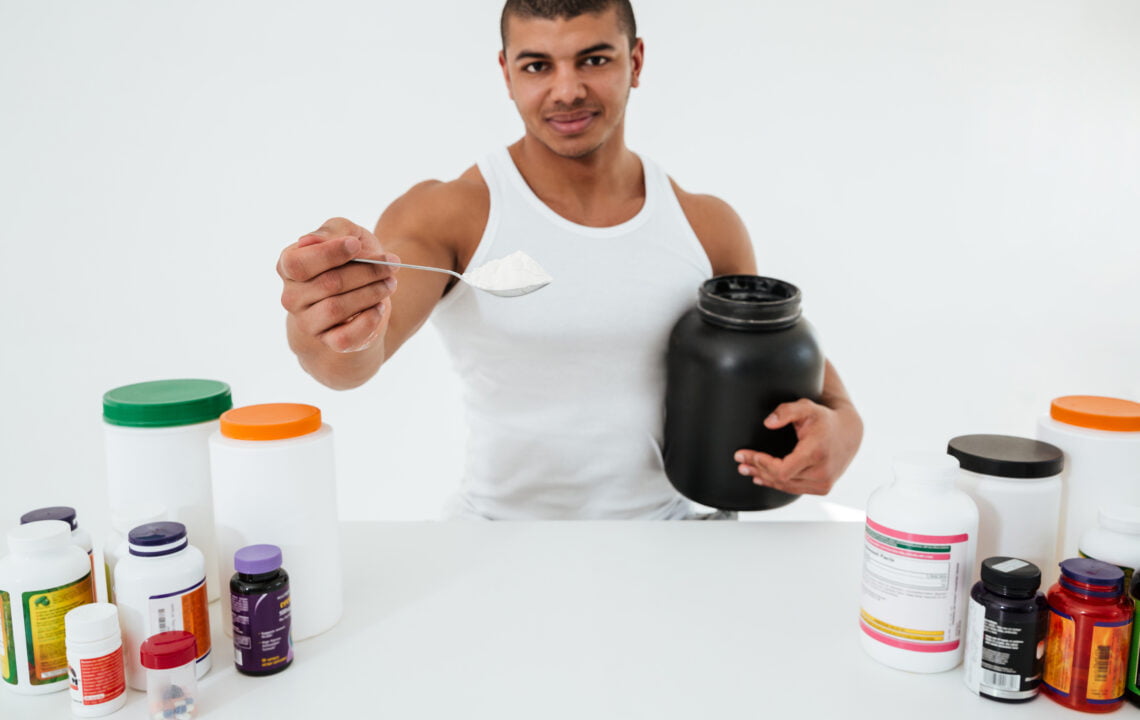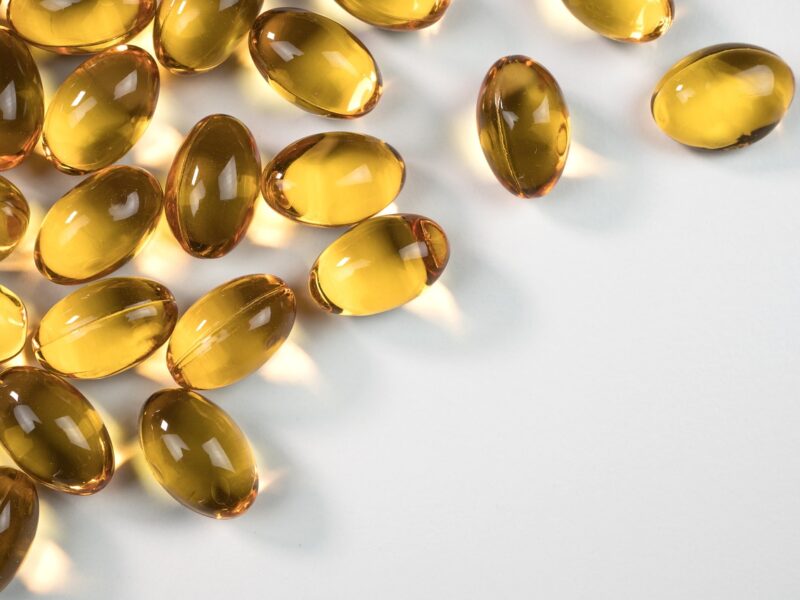Creatine is a popular supplement for athletes aiming to increase their strength and muscle growth. If you notice your muscles expanding, an improvement in your workout performance, or a quicker recovery after exercise, it’s likely that creatine is working for you. It boosts your muscle energy, allowing for more intense and prolonged workouts.
Creatine is found in foods like meat and fish and is also made by your body. Taking extra creatine increases the energy in your muscles, making it easier to do quick, powerful activities. Seeing these kinds of changes in your body and how you perform in workouts means the creatine is doing its job.
Studies show that creatine is safe and works well if you use it the right way. So, if you’re getting stronger, doing better in your workouts, and feeling good, it’s likely because the creatine is working.
Creatine is found in foods like meat and fish and is also made by your body. Taking extra creatine increases the energy in your muscles, making it easier to do quick, powerful activities. Seeing these kinds of changes in your body and how you perform in workouts means the creatine is doing its job.
Studies show that creatine is safe and works well if you use it the right way. So, if you’re getting stronger, doing better in your workouts, and feeling good, it’s likely because the creatine is working.
When it comes to building muscles, there are no shortcuts, even with creatine. When taken by itself, creatine doesn’t cause muscle bulking. Rather, muscle strength is gradually built during high-resistance training or exercise.
How Creatine Work In Your Body?
Creatine works in your body by helping to produce more energy for your muscles, making it especially useful during high-intensity, short-duration exercises like lifting weights or sprinting. Here’s how it works in simple terms:
Energy Production: Your muscles need energy to move, which comes from a molecule called ATP (adenosine triphosphate). After ATP is used for energy, it becomes ADP (adenosine diphosphate). Creatine comes into play by donating a phosphate group to ADP, turning it back into ATP. This process allows you to have more energy for your workouts.
Increased Performance: With more ATP available thanks to creatine, your muscles can perform better during workouts. This means you can lift heavier, sprint faster, or do more repetitions than you could without creatine. Over time, this leads to increased strength and muscle size.
Water Retention: Creatine can also cause your muscles to hold more water, making them appear larger and fuller. This isn’t just about looks; the extra water can help with muscle recovery and growth.
Enhanced Recovery: Creatine isn’t just about providing more energy for your muscles during workouts; it also helps with recovery after exercising. By improving cell signaling for muscle repair and growth, reducing muscle breakdown, and increasing glycogen storage, creatine helps your muscles repair and grow stronger.
Energy Production: Your muscles need energy to move, which comes from a molecule called ATP (adenosine triphosphate). After ATP is used for energy, it becomes ADP (adenosine diphosphate). Creatine comes into play by donating a phosphate group to ADP, turning it back into ATP. This process allows you to have more energy for your workouts.
Increased Performance: With more ATP available thanks to creatine, your muscles can perform better during workouts. This means you can lift heavier, sprint faster, or do more repetitions than you could without creatine. Over time, this leads to increased strength and muscle size.
Water Retention: Creatine can also cause your muscles to hold more water, making them appear larger and fuller. This isn’t just about looks; the extra water can help with muscle recovery and growth.
Enhanced Recovery: Creatine isn’t just about providing more energy for your muscles during workouts; it also helps with recovery after exercising. By improving cell signaling for muscle repair and growth, reducing muscle breakdown, and increasing glycogen storage, creatine helps your muscles repair and grow stronger.
Is Creatine Safe?
Yes, creatine is generally considered safe for most people when used appropriately. It is one of the most researched supplements in the sports nutrition field, with numerous studies supporting its safety and efficacy for short-term and long-term use. Here are a few key points regarding the safety of creatine:
Research Findings: Extensive research has shown that taking creatine in recommended doses does not cause harmful side effects for healthy individuals. The most common side effect reported is weight gain, which is due to water retention in the muscles, not fat gain.
Kidney and Liver Health: Concerns have been raised about creatine’s impact on kidney and liver health, but studies in healthy individuals have not found significant evidence that creatine supplementation adversely affects these organs. However, individuals with pre-existing kidney or liver conditions should consult a healthcare professional before starting creatine.
Hydration and Cramping: Some people believe that creatine supplementation can lead to dehydration and muscle cramping, but research does not consistently support these claims. Drinking plenty of water while taking creatine is recommended to ensure proper hydration.
Age Considerations: Creatine is generally recommended for adults, and while there is some evidence to suggest it can be safe for young athletes, it’s important for minors to consult with a healthcare provider before starting any supplementation.
Quality and Purity: It’s crucial to purchase creatine from reputable sources to ensure the product is free from contaminants and adulterants that could be harmful.
Recommended Dosage: Following the recommended dosages and guidelines for creatine supplementation is important for safety. A common regimen includes a loading phase of 20 grams per day (divided into 4 doses) for 5–7 days, followed by a maintenance phase of 3–5 grams per day. However, some opt to skip the loading phase and simply take the maintenance dose from the start, which is also effective but may take longer to see benefits.
Research Findings: Extensive research has shown that taking creatine in recommended doses does not cause harmful side effects for healthy individuals. The most common side effect reported is weight gain, which is due to water retention in the muscles, not fat gain.
Kidney and Liver Health: Concerns have been raised about creatine’s impact on kidney and liver health, but studies in healthy individuals have not found significant evidence that creatine supplementation adversely affects these organs. However, individuals with pre-existing kidney or liver conditions should consult a healthcare professional before starting creatine.
Hydration and Cramping: Some people believe that creatine supplementation can lead to dehydration and muscle cramping, but research does not consistently support these claims. Drinking plenty of water while taking creatine is recommended to ensure proper hydration.
Age Considerations: Creatine is generally recommended for adults, and while there is some evidence to suggest it can be safe for young athletes, it’s important for minors to consult with a healthcare provider before starting any supplementation.
Quality and Purity: It’s crucial to purchase creatine from reputable sources to ensure the product is free from contaminants and adulterants that could be harmful.
Recommended Dosage: Following the recommended dosages and guidelines for creatine supplementation is important for safety. A common regimen includes a loading phase of 20 grams per day (divided into 4 doses) for 5–7 days, followed by a maintenance phase of 3–5 grams per day. However, some opt to skip the loading phase and simply take the maintenance dose from the start, which is also effective but may take longer to see benefits.
How Should Creatine Make You Feel?
When taking creatine, you might not feel an immediate or dramatic difference in the way you feel day-to-day, but there are several effects and benefits that you may notice over time with consistent use:
Increased Muscle Endurance and Strength: As creatine helps regenerate ATP (your muscles’ primary energy source during high-intensity activities), you may find that you can perform more reps during strength training or sustain higher intensity levels in your workouts for longer periods. This doesn’t translate to an instant “boost” of energy like caffeine would give, but rather a gradual improvement in performance and endurance.
Improved Workout Recovery: Some users report faster recovery times after workouts, which means you might feel less fatigued and experience reduced muscle soreness in the days following intense exercise. This is partly because creatine can help reduce muscle cell damage and inflammation.
Increased Muscle Mass: Over time, the combination of improved workout performance and recovery can lead to noticeable gains in muscle mass. The initial weight gain in the first few weeks of creatine use is often due to water retention in the muscles, making them appear fuller and larger.
Enhanced Brain Function: Although less commonly discussed than its physical benefits, some research suggests that creatine can also have a positive impact on brain function, potentially improving memory and cognitive performance. This effect might be subtle and not as immediately noticeable as the physical benefits.
No Stimulant Effects: Unlike supplements that contain stimulants, creatine doesn’t cause jitteriness or a sudden spike in energy levels. Since it works by supporting the energy production systems within your muscles, any changes in energy or endurance are typically more gradual and sustained.
Increased Muscle Endurance and Strength: As creatine helps regenerate ATP (your muscles’ primary energy source during high-intensity activities), you may find that you can perform more reps during strength training or sustain higher intensity levels in your workouts for longer periods. This doesn’t translate to an instant “boost” of energy like caffeine would give, but rather a gradual improvement in performance and endurance.
Improved Workout Recovery: Some users report faster recovery times after workouts, which means you might feel less fatigued and experience reduced muscle soreness in the days following intense exercise. This is partly because creatine can help reduce muscle cell damage and inflammation.
Increased Muscle Mass: Over time, the combination of improved workout performance and recovery can lead to noticeable gains in muscle mass. The initial weight gain in the first few weeks of creatine use is often due to water retention in the muscles, making them appear fuller and larger.
Enhanced Brain Function: Although less commonly discussed than its physical benefits, some research suggests that creatine can also have a positive impact on brain function, potentially improving memory and cognitive performance. This effect might be subtle and not as immediately noticeable as the physical benefits.
No Stimulant Effects: Unlike supplements that contain stimulants, creatine doesn’t cause jitteriness or a sudden spike in energy levels. Since it works by supporting the energy production systems within your muscles, any changes in energy or endurance are typically more gradual and sustained.
How Much Creatine Do I Need Per Day?
The recommended daily dosage of creatine can vary depending on your goals, phase of supplementation, and individual factors like body weight and muscle mass. Here’s a general guideline:
Loading Phase: A common approach to start creatine supplementation is with a loading phase, which aims to rapidly saturate your muscle creatine stores. This phase typically involves taking about 20 grams of creatine per day, divided into 4 doses of 5 grams each, for 5-7 days.
Maintenance Phase: After the loading phase, you transition to the maintenance phase to keep your muscle creatine stores saturated. The recommended maintenance dose is about 3-5 grams per day.
Loading Phase: A common approach to start creatine supplementation is with a loading phase, which aims to rapidly saturate your muscle creatine stores. This phase typically involves taking about 20 grams of creatine per day, divided into 4 doses of 5 grams each, for 5-7 days.
Maintenance Phase: After the loading phase, you transition to the maintenance phase to keep your muscle creatine stores saturated. The recommended maintenance dose is about 3-5 grams per day.

What Foods Are High in Creatine?
Foods high in creatine primarily include animal products, as creatine is naturally found in muscle cells. Here are some of the best dietary sources of creatine:
Red Meat: Beef and lamb are excellent sources of creatine, providing about 1–2 grams of creatine per pound (2–4 grams per kilogram) of raw meat.
Poultry: Chicken and turkey also contain creatine, though slightly less than red meat, offering around 0.5–1 gram per pound (1–2 grams per kilogram) of raw meat.
Fish: Certain types of fish, like salmon and herring, are good sources of creatine, with herring being particularly high at about 1–2 grams per pound (2–4 grams per kilogram) of raw fish. Salmon provides a bit less, but is still a valuable source.
Pork: Similar to beef and lamb, pork contains creatine at approximately 1–2 grams per pound (2–4 grams per kilogram) of raw meat.
Red Meat: Beef and lamb are excellent sources of creatine, providing about 1–2 grams of creatine per pound (2–4 grams per kilogram) of raw meat.
Poultry: Chicken and turkey also contain creatine, though slightly less than red meat, offering around 0.5–1 gram per pound (1–2 grams per kilogram) of raw meat.
Fish: Certain types of fish, like salmon and herring, are good sources of creatine, with herring being particularly high at about 1–2 grams per pound (2–4 grams per kilogram) of raw fish. Salmon provides a bit less, but is still a valuable source.
Pork: Similar to beef and lamb, pork contains creatine at approximately 1–2 grams per pound (2–4 grams per kilogram) of raw meat.
Conclusion: Will Creatine Increase My Power, Strength, and Body Mass?
Creatine is a well-researched supplement that boosts muscle power, strength, and size. It increases ATP in muscles, enhancing energy for intense workouts, leading to better performance and quicker recovery. Visible muscle growth from water retention and muscle fiber increase is a clear sign of its effectiveness.
Considered safe when used correctly, creatine’s benefits can be maximized by following recommended dosages and staying hydrated. Although foods like red meat, poultry, and fish contain creatine, supplements are key for achieving levels that significantly impact performance and muscle development.
Considered safe when used correctly, creatine’s benefits can be maximized by following recommended dosages and staying hydrated. Although foods like red meat, poultry, and fish contain creatine, supplements are key for achieving levels that significantly impact performance and muscle development.





